Improving Organisation Performance – Reflection
 Task 2
Whilst reading the article entitled ‘organisational change models in Human Resource Development’, I soon found myself thinking about my organisation and my own management practice. I thought back to TMA01 and the areas I struggled with in my management practice. The main problem for me was team performance. I found it hard to motivate the team to perform much better than they were. From the article, the model that resonated with me most is the Congruence Model. When studying the key components of this model, I began to ask myself questions such as “is my organisations performance as good as it could be?” and “what changes could be implemented to try to improve things?”.
When I concluded that my organisation could be performing better, I began to think of ways to use the congruence model to unearth the underlying issues and in turn, put forward my ideas as how to fix it. I began to think about my team and about how we perform. I considered the flow of work and the people carrying out the jobs.
As a manager, it is my job to monitor and assess the workload as well as looking after the members of the team but, after reading this article, I understand that whilst I do monitor and assess, perhaps I don’t do it closely enough. I could see more room for improvement in that area.
I began to analyse each key element of the model separately. So rather than look at this in a general sense, I went back to basics and wanted to understand the work that is at the core of our organisations performance.
I began by looking at the work that is done and how it is carried out/processed. Then I had to look at the people doing the jobs. I had to think about whether I had the right people in the right positions within the team. I thought about other depts. How was performance measured outside of our dept.? Were there rewards or incentives offered? These were just a few questions I found myself asking whilst considering the organisation as a whole.
On completion of my analysis, it was clear to see that I didn’t have some of the correct people in the right positions. After carrying out a performance review with my team members, it was quickly established that some individuals could use some further training. Others had to be reminded of the level of work that is expected from them. In order to remedy this, I subdivided the office into sections based on the skillsets of the team members and placed them where I felt they could use their skills best and in turn, produce a good solid standard of work.
I found that I could now run the dept. more efficiently and quite soon after making these changes, performance levels increased. A higher standard of work was being produced and overall, the atmosphere in the office had substantially improved.
494 words
When I look back to TMA01 at the beginning of my B123 studies, it is easy for me to see how this module has helped me to develop my management skills and my thinking. At the beginning of my management term, I struggled with a few areas of management practice. I found it difficult to delegate, I struggled with self-confidence and had difficulty motivating my team. I used my academic readings and study resources to help me overcome these issues.
It wasn’t until I read the article entitled ‘Better project management, Better patient outcomes’ (Williams, J. and Murphy, P., 2005), that I realised just how far I have progressed in terms of development. The article helped me to realise that although I never set out to manage a project officially, I realised that I was managing a project every day when I go to work. My team is my project. Without knowing it, I took on the role of project manager when I decided to tackle the performance problems within my dept. My previous knowledge of project management came from what I had seen on entrepreneurial TV shows or read in books but I never realised until reading this article that I, myself was a project manager. It was a far cry from the person who at the beginning of the process, was too afraid to delegate a duty to another team member.
I have been able to identify Fayol’s management process concept from within this article. The project management cited in the article included Fayol’s five processes: Planning, Organising, Leading, Co-ordinating and controlling (Fayol. H, 1949).
From this article (Williams, J. and Murphy, P., 2005) and the article entitled ‘organisational change models in Human Resource Development’, I have learned that the development of management practice is never ending. There are always opportunities to identify lessons that need to be learned. We cannot anticipate or identify events prior to their happening and so are always faced with fresh challenges. It is how we tackle these challenges, that helps us to develop our learning and understanding of what is to be a manager. When I became a manager, I wasn’t given any training. I had to learn as I went along. I don’t think that I would have been as successful had I not had the help of my academic studies. These readings, along with the various models and ideas I have studied over the past year have made me reflect on my journey and on what I have learned along the way. I have begun to think about my own performance and have asked myself “do I need to do things differently”? I think for now I am happy to keep working in the same way. My development through what I have learned has not only had a positive impact on me, but also on my team. We work better together now than I ever could have imagined at the beginning of my managerial term.
496 words
Task 3
At the beginning of my B123 studies and through preparation for TMA01, I was able to identify the development needs I had in my current role. Firstly, I didn’t know what kind of leader I was. My reading at the earlier stages of B123 gave me the opportunity to think about my own leadership skills. Activity 5.2 helped a lot. It allowed me to reflect on previous encounters with authoritative figures and made me think about their leadership styles. My reading enabled me to recognise that I am a transformational leader. This activity broadened my mind and I learned that having a strong sense of control present in a work based environment helped me to steer my team in the right direction. I reflected on things that had gone wrong in the past and then used these experiences to make improvements within myself and my team.
Along the way, I found that there were more areas of my job that I could do better. For example, delegation and motivation. I found Mintzbergs publication of his ten managerial roles as a guide for managers (Tyler, 2007, p.283-283) very useful in helping to address these development needs. I found that Mintzbergs theory could be used to categorize the different duties of a manager. I discovered that through following these roles, I could develop my own management skills and further my managerial knowledge.
Mintzbergs code of conduct and practice gives a clear and concise idea of what is expected of managers. I like to think of Mintzbergs theory as a skeleton and the code of practice as the meat that goes onto the bones. Mintzbergs theory lays the groundwork to get us thinking about the role of a manager, whereas the code of conduct gives us a comprehensible path to follow in order to succeed whilst staying within the legal boundaries. In evaluating my own performance as a manager, I found it useful to write out Mintzbergs ten management roles and score myself out of five on each role from being very skilled to not skilled at all. I found that by carrying out this exercise, I could clearly identify my weak spots and focus on improving these areas.
Through this process, I found that I spent most of my time fulfilling my role as leader but needed to build more on my self-confidence. I found that by reflecting on the things that I had already learned and achieved, helped me to develop this. As Mintzberg said “The manager who only communicates or only conceives never gets anything done, while the manager who only ‘does’ ends up doing it all alone.” (Daft, R., Marcic, D., 2011, p. 17). Applying Mintzbergs Managerial Roles has helped me a great deal in my current role and have made me see things in a different light than before.
472 words
Task 3
Whilst identifying the elements of my management practice that had improved, I found that there are most definitely still areas of my job that I could do better. For example, delegation. I like the following quote by American businessman Robert Half “Delegating work works provided the one delegating works, too”. However, I find it hard to pass work down to members of my team. This is something that I struggle with and have been ‘criticized’ for in the past by other managers. I like to concentrate my attentions on driving my team members towards achieving their own goals but I don’t like to feel as though I am burdening them with too much work. As a result, I take a lot of the pressure of doing it all myself. This is perhaps an area that I will have to further work on and develop. Perhaps talking to my team about pressures and sharing workloads might help us all grasp a better understanding of sharing the workload. Wong says “Delegation is not the abandonment of tasks.
As a leader, you are still ultimately responsible therefore time should be set aside to observe and meet with the subordinate for follow-through and review of the delegated areas”. (Wong, A. S., 2007). This is exactly what I need to do; let the team work using their own initiatives and observe their performance. I am planning to address this area by assigning tasks to those that I feel are most experienced to carry out the tasks. This should help me to build a stronger relationship with my team. They should feel that I am placing a good level of trust in them. In hand with this, I can let my team-mates work more using their initiatives. I should learn to let them grow from their own experiences and be supportive to them in such self-advancement.
I have also found that overall, I need to take everything that I have learned through B123 and my work experience and mould myself into the best manager that I can be. I found Fayol’s 5 Management Process very helpful when I got to thinking about how I envisage myself as a manager in the near future (Fayol. H, 1949).
I have used these thoughts to come up with a management plan. This is shown below in the form of a diagram.
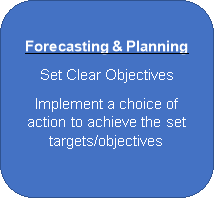
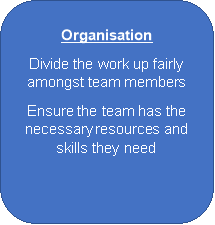
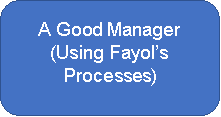


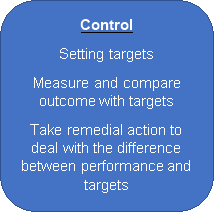
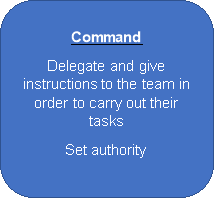



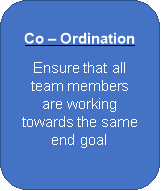
487 words (including diagram)
Bibliography
- Tyler, S., 2007. The Managers Good Study Guide. 3rd ed. Milton Keynes: The Open University.
- Wong, A. S., 2007. Alans Gleanings. [Online] Available at: http://www.vtaide.com/gleanings/delegation.htm [Accessed 20th February 2016].
- Manktelow, J. et al., 2016 Mind Tools [Online] Available at: Â [Accessed 24th February 2016]
- MAW Editor, 2016, Management at Work[Online] Available at: Â [Accessed 20th December 2016]
- Daft, R., Marcic, D., 2011, Understanding Management. 8th Edition. Cengage Learning Customer Publishing, Boston
- Fayol, H., 1949. General and Industrial Management. Martino Fine Books (2013 Re-print)
Articles:
- Williams, J., Murphy, P. (2005) ‘Better project management Better patient outcomes.’, Nursing Management, vol. 36, no. 11, pp. 41-47.
Link:
- Benjamin, B., Naimi, L., Lopez, J. (2012) ‘Organizational Change Models In Human Resource Development.’, Insights to a Changing World Journal, no. 2, pp. 55-66.
Link: